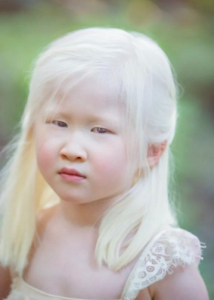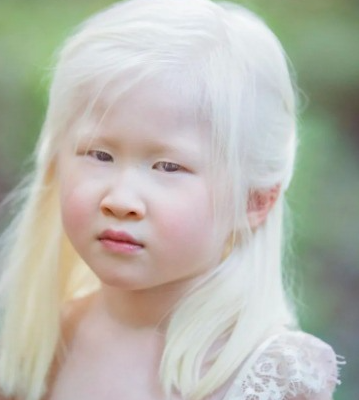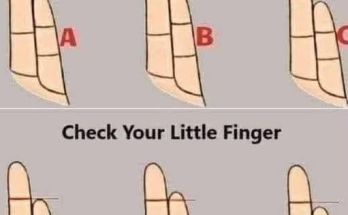In the quiet hours of a morning in China, a baby girl was left at the doorstep of an orphanage. She had pale skin, silvery-white hair, and eyes that shimmered with a translucent hue. Her appearance was striking—ethereal even—but to her birth parents, it was “too weird.” They walked away, leaving her swaddled in silence and stigma.
Her name would become Xueli Abbing, a name given by the orphanage staff: “Xue” meaning snow, “Li” meaning beautiful. And though her beginning was marked by abandonment, her journey would become a radiant testament to resilience, beauty, and the power of reframing difference into strength.
🌸 Born Different, Treated as Less
Xueli was born with albinism, a genetic condition that reduces melanin production, resulting in very light skin, hair, and eyes. In many cultures, especially where misinformation and superstition persist, albinism is misunderstood. People with albinism are often stigmatized, feared, or even hunted. In some regions, myths claim their bones hold magical properties. In others, they’re seen as cursed or ghostlike.
In Xueli’s case, her parents saw her as “too strange” to raise. Under China’s one-child policy, many families made heartbreaking decisions about which child to keep. For Xueli, her appearance sealed her fate. She was left behind.
🫂 A New Family, A New Beginning
But fate had other plans. A Dutch family adopted Xueli when she was three years old. They brought her to the Netherlands, where she was raised with love, care, and the freedom to explore who she was beyond her condition.
Her adoptive mother and sister, Yara, became her anchors. They nurtured her curiosity, encouraged her creativity, and helped her navigate a world that still often stared too long or judged too quickly.
🎨 Modeling by Accident, Impact by Design
At age 11, Xueli’s life took an unexpected turn. A designer in Hong Kong invited her to participate in a photo shoot called “Perfect Imperfections”—a campaign celebrating diverse beauty. The experience was transformative. For the first time, Xueli saw her difference not as a flaw, but as a feature.
She later said, “I’m lucky I was only abandoned.” Her words carried both pain and perspective. She knew others with albinism faced far worse. But she also knew she had a voice—and she intended to use it.
📸 Vogue Italia and the Power of Visibility
A London-based photographer saw something extraordinary in Xueli and helped her build a portfolio. Their collaboration led to one of her photos being featured in Vogue Italia’s June 2019 issue. It was a milestone not just for her, but for representation in fashion.
“I didn’t even know how big Vogue was,” she recalled. “But when people started reacting, I realized how important it was to be seen.”
Her presence in Vogue challenged the industry’s narrow standards. She wasn’t tall or traditionally glamorous. She had limited vision—only 8 to 10%—and couldn’t look directly at the camera because of light sensitivity. But she had something deeper: authenticity.
🧠 Reframing Beauty and Identity
Xueli’s story is more than a modeling success. It’s a reframing of identity. She refuses to be called “an albino,” preferring “a person with albinism.” It’s a subtle but powerful shift—one that centers humanity over condition.
She’s spoken out against the use of albino models as angels or ghosts, saying, “It makes me sad.” These portrayals, though often well-intentioned, reinforce stereotypes. Xueli wants people to see individuals with albinism as full, complex, and beautiful—not mystical or otherworldly.
🔥 From Abandonment to Advocacy
Today, Xueli uses her platform to raise awareness about albinism and challenge discrimination. She’s become an advocate, a speaker, and a symbol of hope for children born into stigma.
Her journey—from orphanage steps to international runways—is a reminder that beauty is not defined by symmetry or sameness. It’s found in the courage to be seen, the strength to speak, and the grace to forgive.
🪞 A Mirror for Us All
Xueli’s story invites us to reflect. How do we respond to difference? Do we recoil, stare, or dismiss? Or do we lean in, listen, and learn?
Her life is a mirror—showing us our biases, our fears, and our capacity for change. It’s a call to build a world where no child is abandoned for looking “too weird.” Where every person is seen as more than their condition. Where beauty is not a mold, but a mosaic.
🌈 The Future She’s Creating
Xueli dreams of a world where people with albinism are celebrated, not feared. She wants to model not just clothes, but courage. She hopes to inspire young people to embrace their uniqueness and challenge the narratives that limit them.
“I want to change the world,” she says. And she already is.


